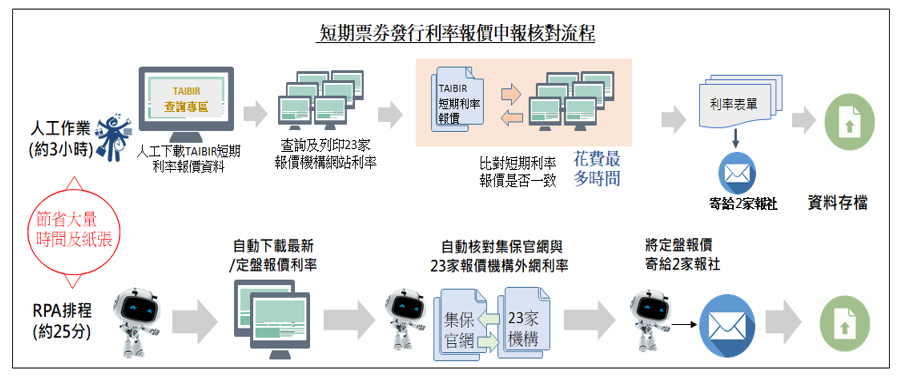TDCC Drives Digital Transformation RPA Implementation Reduces Manual Work by 70%
2023/05/18
Facing the market environment of a declining birthrate and the wave of digitalization, improving productivity is a common challenge for industries. Therefore, companies are seeking solutions in Robotic Process Automation (RPA) to enhance their productivity. TDCC has introduced RPA in multiple core business processes, significantly reducing manual work time and achieving remarkable automation efficiency through digital assistants and human-machine collaboration.
Jane Chang, Senior Executive Vice President of TDCC, stated that the company continuously adopts digital technology to enhance operational efficiency, leading the market in providing high-quality services while optimizing related processes. By leveraging the characteristics of RPA, which enables rapid processing of large volumes of clearly defined standard procedures, TDCC systematizes and automates routine and tedious operations, allowing employees to focus on more valuable tasks and provide digitally innovative services that add value to the market.
In the initial stage of RPA implementation, TDCC conducted workshops to familiarize various departments with RPA and understand suitable application scenarios and limitations. Business analysts (BAs) within the company were trained accordingly. Subsequently, through demand analysis and process mapping, TDCC assisted each department in selecting operational processes suitable for RPA application with 10 in total. This encompassed various core systems of TDCC, including account reconciliation, interest rate quotation verification, account balance inquiries, and bond data archiving, among others. After the introduction of RPA, the average operation time for these routine tasks was reduced by approximately 70% compared to manual work.
Taking the example of the daily verification process for short-term bond issuance interest rate quotations, the original business unit had to manually access the websites of 23 rate-quoting institutions, retrieve and print the daily interest rate quotations, and then compare them one by one with the uploaded content on TDCC's website for consistency. In case of any errors, they had to contact the institutions for correction. Once all the comparisons were correct, the fixed interest rates were emailed to two news agencies, and the data was finally archived. By automating this laborious manual process with RPA, significant time savings were achieved, and approximately 10,000 sheets of paper were saved annually. This not only improved the quality of operations and the benefits of energy conservation and carbon reduction but also enhanced the efficiency and resilience of the company's operations through RPA process optimization.

TDCC positions RPA as a digital assistant for employees. The employees are accepting this new trend after seeing the successful results. Non-IT colleagues are transformed from passive participants to proactive planners, empowering them with digital capabilities and enabling them to independently introduce RPA and drive mindset transformation. TDCC continues to integrate existing big data resources, combined with AI technology, to provide more efficient and diverse digital services, aiming to achieve the goal of "financial infrastructure, digital common prosperity."